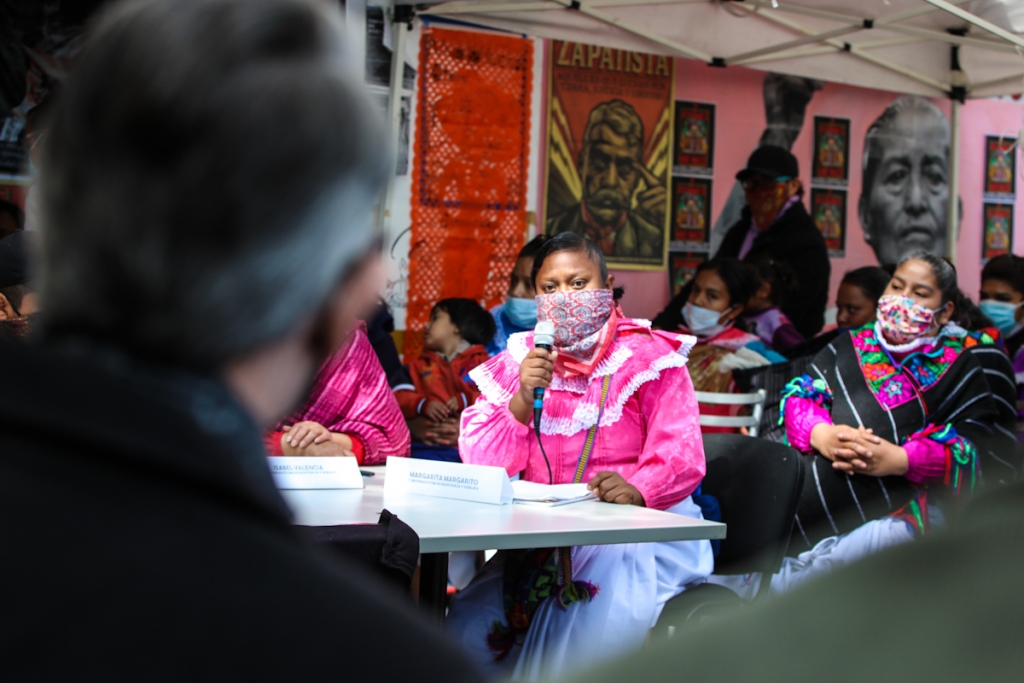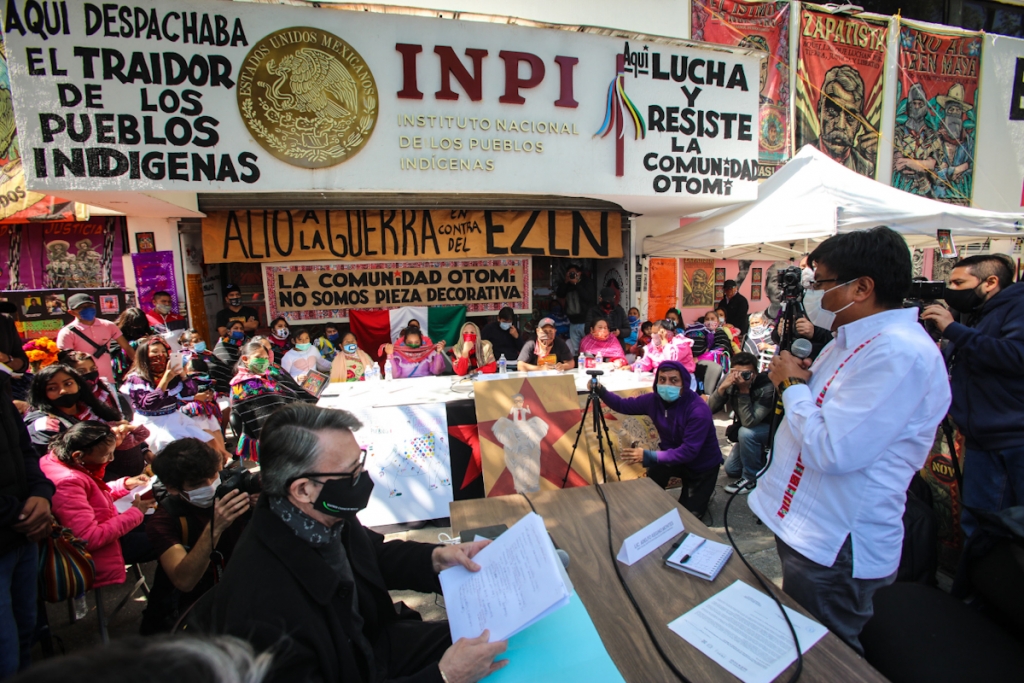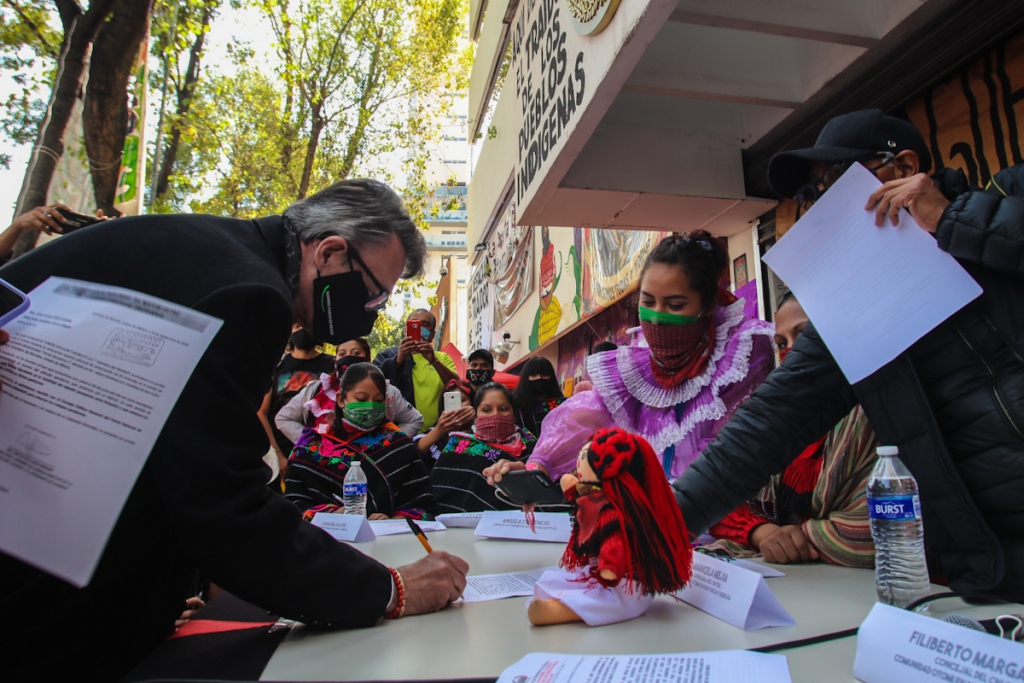
November 4, 2020
Text and photos by Daliri Oropeza
Joaquina described how the police have persecuted her on the streets of downtown Mexico City for selling Lele dolls and other crafts she makes. She described how police officers evicted her in 2019, beating Otomí women, girls, youth, and elders alike from the Roma 18 property in the Juárez neighborhood, where they lived since 1985.
The harassment is constant, said the young woman who participated in the dialogue table that she convened along with her community at the door of the offices of the National Institute of Indigenous Peoples (INPI). The Otomí women have been on the property for 21 days. Without neglecting their children, they were the most active participants in the dialogue.
The dialogue became a testament of grievances against her community, the Ñhañhö people of Santiago Mexquititlan, Querétaro: marginalization, impoverishment, lack of work, displacement and internal migration, racism, discrimination, no access to services, education, health, harassment and police eviction, gentrification, neglect by the authorities, institutional racism, lack of recognition of their self-determination. This, they recalled, is what led the women to occupy the INPI.
“The neighbors gather signatures and take them to the Cuauhtémoc delegation so that we can’t have water, or they gather signatures to displace us. We say it’s not fair. We have the right to decent housing—housing that we pay for, that is not given to us for free,” Joaquina exclaimed into the microphone, after her colleagues described their repeated attempts to get attention, and the discrimination by local and federal agencies.
The Otomí community stated their demands to Adelfo Regino, head of the INPI; José Alfonso Suárez del Real, Secretary of the Government of Mexico City on behalf of Claudia Sheinbaum, who had tested positive for COVID-19. Also present were Josefina Bravo Rangel, representative of the Interior Ministry’s Commission for Dialogue with the Indigenous Peoples of Mexico; Rodrigo Chavez Contreras, head of the Housing Institute of Mexico City; and Juan Gutiérrez Marquez, director of political consultation in the city.

The first demand of the Otomí community is the immediate expropriation of four properties. One is shared by the streets Roma 18 and Londres 7 in the Juárez neighborhood; two are in Zacatecas 74 and Guanajuato 200, in the Roma neighborhood. One more is in Zaragoza 1434, where a Mazahua community lives. These properties had unclear legal status ever since they were abandoned after the 1985 earthquake. After the 2017 earthquakes, the Otomí families of Roma 18 began to live on the street because the building fell. Despite attempts to regularize the ownership of the properties, a real estate agency obtained the property.
“Is there going to be housing? yes, including where we live (Juárez neighborhood), but the Otomí community is not taken into account in this gentrification process. Not even by the neighbors,” claimed Maricela, an adult woman who wears black and bright red pleats and ruffles with a white skirt.
“Then we say: housing for whom, housing for whom? For those who pay, for those who gentrify. Not for our community. We as Otomí also have the right to live in the city.”
Maricela is a member of the Mexico City Otomí community, a resident of Roma 18. “They offered us money,” Filiberto said of the Otomí community, explaining that this is how they divided those who have inhabited the property.
“We don’t want money, we want decent housing, education, health,” he said.
The people who took over the INPI belong to the Otomí community that joined the National Indigenous Congress (CNI), a network that includes the Zapatista Army of National Liberation.
Community members also demanded a halt to the remodeling of downtown Mexquititlan. They explained that the residents, those who have migrated as well as those who continue to live there, do not want tourism projects. They warned that the expropriation or restitution of the four properties mentioned must be carried out or they will not leave the INPI property.
The Otomí community presented a 10-point proposal to the government delegation, to be discussed at a dialogue session to be held at the door of the Institute’s offices. Second, the current authorities, that is, Regino and Sheinbaum, as well as someone from the Ministry of Agrarian, Territorial, and Urban Development or from the government of Querétaro, must attend the dialogue and to address the rejection of tourist work in Mexquititlan. Third, the authorities must be accompanied by the officials capacitated to address the demands. Fourth, there must be signed minutes.
The fifth proposal was that there be a guarantee that the agreements reached would be fulfilled and that they would be publicized in the media. Also to make public the expropriation decree(s). As the eighth point, they ask that there be no reprisals or criminal action against those who took over the facilities.
As a ninth point they demanded the cancellation of the remodeling of the main square of Santiago Mauritian and respect for the indigenous council that was formed there to defend the original tianguis, as well as their self-determination and self-government. For this, all parties will be in consultation regarding agreements made in the dialogue.
The parties agreed to a new dialogue on Tuesday, November 10, for a first resolution on the demands and the requested expropriation.

“We are going to rectify”
Adelfo Regino, head of INPI, apologized to the Mexico City Otomi community for the grievances they have suffered.
“I want to offer an apology, because reports have been made here that force has been used, that no attention has been paid. I offer an apology, we are going to rectify this and we are going to enter into a dynamics of collaboration,” said Adelfo Regino, head of the INPI.
The official supported the demands of the Otomí community in Mexico City and assured that they will work to ensure that they are addressed.
“As the government we fully share their demands, their historical claims, and for that reason we are here and we will be here as many times as necessary, until their just demands are resolved.”
For his part, José Suárez del Real, Secretary of the Government of Mexico City, recalled the history of the Roma 18 property, which also involves London 7 in the Juárez neighborhood. He assured that at some point the place was the embassy of the Spanish Republic, seat of the Spanish government in exile.
“The best people to receive this place are you, who have taken care of it, I am convinced you are the ones who have fought and defended the property, so now people can recognize that it was ended by a dictatorship. It is important to understand how fair it would be to rebuild that past with you,” said Suarez del Real.
“We will do everything we can to properly attend to the requests that are being made of us,” said Suárez del Real told Pie de Página an interview after the dialogue.
The women and the Otomí community in general were respectful at all times during the dialogue, and although they expressed their anger and rage during the participations, at no time were there any disagreements.
Among the Otomí women, however, there was a trace of mistrust due to all that they have lived live through at the hands of government agencies. In an interview at the end of the dialogue, they said that they want the solution to their demands to be actions and not words.
The CNI Network

Margarita, a woman with a strong character who is also part of the Otomí community residing in the city, denounced that the INPI is promoting megaprojects that drive people to leave the towns where they invade.
Members of this Otomi community who participate in the National Indigenous Congress knew Adelfo Regino when he was still part of this network of indigenous people that was established during the San Andrés Accords.
During the dialogue, the official was reminded of his participation in the CNI network, and they read his own words from the 2001 Congress of the Union in, when he, Commandanta Ramona, and Nahua spokesperson María de Jesús Patricio, were elected in an assembly to broadcast the position of the EZLN and the CNI regarding the reform of indigenous rights.
The women asked Regino if he remembered where he came from, and what they built since the San Andrés accords. They asked him not to call them “brothers and sisters” as he did at the beginning, because they feel betrayed by him.
The Otomí community residing in Mexico City demanded that the repression and paramilitarization in Chiapas stop, that what the EZLN has built be respected, and that the current administration’s megaprojects and its destruction of nature end. Among the demands raised is the cancellation of the Maya Train, of the Integral Morelos Project, of the Interoceanic Corridor, the Dos Bocas refinery, the Santa Lucía airport, mining, and other projects that affect the peoples that participate in the CNI.
Originally published in Spanish in Pie de Página under the title “Comunidad otomí logra diálogo; titular del INPI ofrece disculpas”
English translation by Sexta Grietas del Norte
